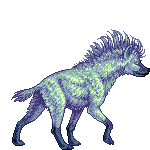Viewing WdI0w

Breed: Osta Frakaso ❄ This is a seasonal species.
View checklist This creature has too many gene combinations to have a checklist.
Gender: Male
Father: Unknown
Unknown Pedigree
Hardiness: 16
Appearance: 7
Emerged: 21:05 22.12.2022
Matured: 8:17 24.12.2022
Traveling in clans of five to fifteen members, Osta Frakasos are a somewhat rare sight in more southerly climes. These large carnivores can be found in snowy climes year-round, but they will follow the cold weather south during winter in search of prey and scavenging opportunities. During this migratory period, Osta Frakasos are less territorial than normal, even occasionally forming larger clans with their neighbors in order to take on larger prey. Communal grooming within a clan is important, both as a bonding activity and as a way to keep all members’ coats clean of viscera that might otherwise freeze into them. Osta Frakasos also sleep in communal groups, known as huddles, to keep warm on cold nights. At the heart of the huddle are the highest-ranked females and their pups, with lesser ranked members on the fringes of the group. While these dominant Osta Frakasos benefit greatly from their strength, aggression, and rank, they are often the first of their clan thrust into danger when it arises. On particularly clear nights, barks and yaps can be heard from Osta Frakosos settling down to rest.
The creatures that dwell in this rather desolate world still display some diversity in appearance, eating habits, and social behavior. Whether they have fur or feathers, skin or scales, their unique genetic makeup allows for a variety of colors and markings within each species. Despite limitations in food sources, herbivores, omnivores, and carnivores are all present in the food chain, and each species requires specialized care within a laboratory. Although the artificial setting of housing units and breeding pods precludes most opportunities to study true interspecific behavior, the interactions within and between species has been studied extensively in the wilderness by scientists daring enough to venture beyond the outpost’s walls.
